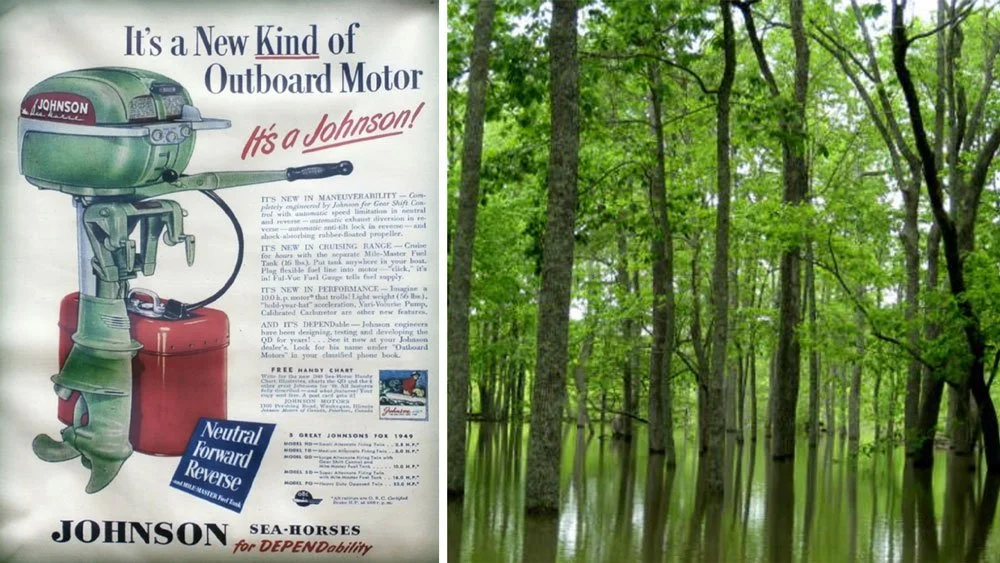Raising greatness: The Cotter Pin
The greatest key to raising greatness is contained in the “cotter key” metaphors in life. They happen most often in off-grid adventures, leaving everything behind except for anticipation. Holy Grove, Arkansas, was one of those places. This is wild country that consists of slack water lakes created by the spring runoff waters of the White River basin. For a millennium, these lakes have been fed about once per year by the floodwaters of the big river systems near the Mississippi. When the floodwaters recede, many small lakes emerge with fresh water and a fresh supply of fish until the next flood. Many fish camps and cabins built upon stilts or up on the bluffs dot the landscape around these lakes. We had a half acre on East Lake, about seven miles from Holy Grove and the surrounding cotton fields. When the dirt roads dried out in late spring, we would drive several miles back into the hardwood thickets to our little piece of heaven, perched on a bluff about 20 feet above this several-mile-long slack water lake. The cypress knees and old grove timber lining the banks provided structure for the fish. There were also areas of flooded timber that connected various lakes when the water was up a little and could last most of the year. Without a good sense of direction and a supply of cotter keys, you could get in trouble and lost in a hurry.
The thought of being stranded overnight with mosquitoes and water moccasins in a place like that was sobering. And that is the point. Raising greatness has to take place outside of the norm, with something on the line.
We have created a cocoon of comfort, thermostat control, and sterile environments in which to live. Cotter key moments have to happen elsewhere. They require a return to the outdoors. You can’t afford to skip this chapter or disregard it because of your lack of experience or poor previous experiences in the wild. It is key to raising greatness. Ease into it, but make it a priority several times per year. It is key to raising greatness in the next generations.
When my older brother and I entered the 14-foot johnboat with our dad for the first time, he made it clear that we were heading out on an exhilarating adventure into the flooded timbers, and potential danger was part of it. He said, “That is where the fish are hiding.” We had a small five-horsepower Johnson outboard motor and a couple of paddles for backup.
My dad had previously taught us how to cast our lures using an open-face bait-casting reel. He took such patience teaching us this art, knowing it would serve us well on many adventures in front of us. Before we took off, he opened his tackle box and showed us a very small, two-inch-long, cylinder-shaped piece of metal about the diameter of a small drinking straw. He had several of them. He told us there was nothing more important in the tackle box on a day like this when you are headed for the flooded timber. He taught us that it was called a cotter key. If the blade of the motor hit a rock or submerged stump or tree, the cotter key would shatter, thus preserving the blade and engine. At that point, the blade would be disengaged, and there would be no propulsion, thus rendering you stuck to paddling if you wanted to return to camp. And that was a very arduous and inefficient way of maneuvering a boat when you were fishing miles from the camp at dusk.
From experience, he had learned from his dad and was passing down wisdom. We watched as he lifted the shaft of the motor out of the water, carefully removed the blade, and demonstrated how to replace the cotter key. He allowed each of us to experiment with it until we had it down.
Adventures need to be exhilarating yet safe through thorough preparation. And the cotter key, though looking completely insignificant, made the adventure amazing. Yes, we broke a cotter key most of the time and several on several occasions. But to get to the fish, the true adventure, you had to take chances and go where other fishermen wouldn’t. At the end of the day, with a stringer full of fish, we would head back to camp. The low light at dusk and the inability to locate all of the submerged timber well was always exhilarating and heart-stopping. But we always had a cotter pin in the waiting and knew we could make it back to camp. Every great fishing adventure I had in that river and lake system with my dad or granddad started with a very insignificant two-inch piece of metal. It was the key to both catching fish and avoiding danger, the two goals of the great adventure.

